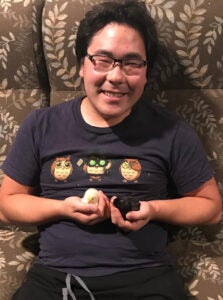Congratulations to our recent graduate, Dr. Yuzo Yanagitsuru! Thank you for all that you have done in the lab, especially your work on longfin smelt. We wish you the best on your future endeavors.
Yuzo was recently featured in the UC Davis Wildlife, Fish, and Conservation Biology newsletter “The Wildlife Whisper.” See his interview below.

Name of your PhD project:
Physiological Insights Towards Improving Longfin Smelt (Spirinchus thaleichthys) Conservation Aquaculture
Feel free to describe your project with a few sentences, and maybe tell us a little bit about why and how you ended up working on the topic.
One of the ultimate goals of the longfin smelt project (still not quite there yet) is to establish a conservation aquaculture program (i.e. keep the species’ entire life cycle in captivity) for longfin smelt, which are listed as ‘threatened’ under the California Endangered Species Act. My project focused on figuring out ways to better keep the larvae alive in captivity, which has so far been the major bottleneck in establishing the longfin smelt culture. I’m happy to say that we have made a small breakthrough in the culturing program by improving larval survival, which has also translated to higher survival to the later life stages.
I kind of just fell into it. About a month before I was coming to Davis my PI asked if I wanted to write a proposal for a project on longfin smelt and I was keen because I thought it sounded like a fun project. But also 20% of the reason I said yes is because I was afraid to say no to my new boss.
What has been your “take away” from being part of the project?
Small changes can make a big difference. In reference to the project, what we found is that changing larval culturing salinities from freshwater (<1 parts per thousand [ppt]) to 2 ppt can make a big difference in larval survival.
Please tell us one of your “aha” and your “wow” moments as a graduate student.
I’ve been telling myself “wow I feel really tired” and getting very little done for a lot of grad school so I guess an “aha” moment would be when I realized that having a work-life balance actually improved my productivity.
What does the next chapter hold for you?
I’ll be a postdoc at University of Washington and NOAA Northwest Fisheries Science Center working on sablefish aquaculture.